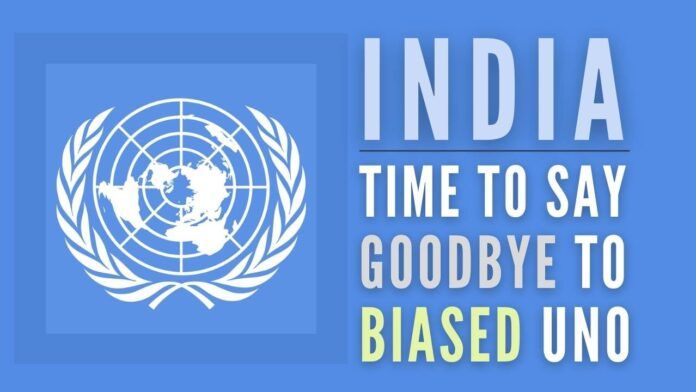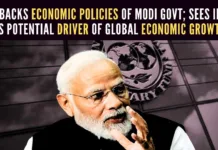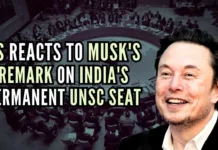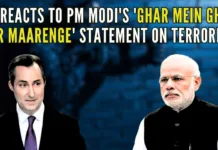
Biased UNO backing Pakistan against India
On May 27, United Nations General Assembly (UNGA) president, Volkan Bozkir, crossed the red line and openly and in a most brazen manner sided with the aggressor Pakistan. That day, he addressed the press conference, along with the Pakistan Foreign Minister, Shah Mahmood Qureshi, at Islamabad and made a number of utterly unacceptable and provocative statements indicating his support for Pakistan and bias against India. He virtually equated Palestine with J&K and asked Pakistan to raise the so-called Kashmir issue more vigorously at United Nations Organisation (UNO)[1].
“I think it is the duty, especially Pakistan’s, to bring this (Kashmir issue) to the UN platform more strongly,’ said the compromised Bozkir, adding that “he agreed that the Palestinian issue and Kashmir issue were of the same age” and that “the status of J&K should not be changed”. Obviously, he referred to the abrogation of pernicious Articles 35A and 370, bifurcation of J&K and creation of Union Territories of J&K and Ladakh.
This Resolution clearly asked Pakistan to withdraw its troops before plebiscite could be organized in the State of J&K as it existed on August 15, 1947.
What the compromised UNGA president said was against both what August 13, 1948, UN Security Council Resolution provided for and what the UN Secretary-General Kofi Annan said on March 17, 2001.
What did the UN Security Council Resolution say? It, inter-alia, said: “The Governments of India and Pakistan agree that their respective High Commands will issue separately and simultaneously a cease-fire order to apply to all forces under their control in the State of J&K as of the earliest practicable date or dates to be mutually agreed upon within four days after these proposals have been accepted by both Governments…As the presence of troops of Pakistan in the territory of the State of J&K constitutes a material change in the situation since it was represented by the Government of Pakistan before the Security Council, the Government of Pakistan agrees to withdraw its troops from that State. The Government of Pakistan will use its best endeavour to secure the withdrawal from the State of J&K of tribesmen and Pakistan nationals not normally resident therein who have entered the State for the purpose of fighting. Pending a final solution the territory evacuated by the Pakistan troops will be administered by the local authorities under the surveillance of the Commission…Pending the acceptance of the conditions for a final settlement of the situation in the State of J&K, the Indian Government will maintain within the lines existing at the moment of cease-fire the minimum strength of its forces which in agreement with the Commission are considered necessary to assist local authorities in the observance of law and order. The Commission will have observers stationed where it deems necessary…The Government of India will undertake to ensure that the Government of the State of J&K will take all measures within their power to make it publicly known that peace, law and order will be safeguarded and that all human and political rights will be guaranteed”.
This Resolution clearly asked Pakistan to withdraw its troops before plebiscite could be organized in the State of J&K as it existed on August 15, 1947. It also recognized the Indian sovereignty over the whole of J&K by allowing it to station troops in the areas to be vacated by Pakistan to maintain law and order there. But Pakistan didn’t vacate the aggression. Instead, it changed the political status of what we call PoJK by merging Gilgit-Baltistan with Pakistan and handing over a huge chunk of its land to China[2].
And what did UN Secretary-General Kofi Annan do and say between March 11 and 17, 2001? He rejected outright Pakistan’s persistent demand for implementation of the UN resolutions on J&K and said these were not self-enforcing and the only way out was negotiations between the two parties.[3]
”There are Security Council resolutions which are important, but they are not self-enforcing,” Annan told reporters, on the last leg of his four-nation tour of South Asia. He also rejected the Pakistani demand seeking the establishment of a separate UN Human Rights Commission for J&K He made these important statements after wide-ranging one-to-one talks with External Affairs Minister Jaswant Singh, which was followed by delegation-level parleys.
It needs to be underlined that Kofi Annan had explained why the UN resolutions on J&K could not be implemented on the lines of the resolutions on East Timor. He had said: “There were two types of UN Resolutions: those falling under chapter seven and others under chapter six of the UN Charter. Resolutions on J&K, which fall under chapter six, are essentially about peace-making and wherein both the parties to the dispute agree to UN intervention. A resolution under chapter six can also be rejected by either party without involving any sort of punitive action”.
Indeed, what Kofi Annan said was what was described as a “rude shock for Pakistan”, which had been projecting the “Kashmir issue” as the “core problem of South Asia”.
It is heartening that India lashed out at the UNGA president Bozkir on May 29 over what New Delhi called “misleading” remarks on the “Kashmir issue”. However, it was not enough given the nature of the nasty stand that he took. India must exercise the option of coming out of the UN, which is a compromised and biased body.
Note:
1. Text in Blue points to additional data on the topic.
2. The views expressed here are those of the author and do not necessarily represent or reflect the views of PGurus.
References:
[1] India Slams UNGA President’s Remarks on Kashmir During Pakistan Visit – May 29, 2021, The Wire
[2] Pakistan to merge Gilgit-Baltistan with the mainland under China’s pressure for completion of CPEC – Oct 04, 2020, Zee News
[3] UN-scrambling Pakistan’s Kashmir stand – Apr 18, 2001, MEA.gov
- ‘Kashmir My core constituency’: Revisiting July 12, 2003 to understand politics, Omar Abdullah-style - March 15, 2024
- Total deviation from traditional approach: Seven takeaways from PM Modi’s March 7 Srinagar visit - March 9, 2024
- Status of political parties: Why is further J&K reorganization imperative? - March 1, 2024










